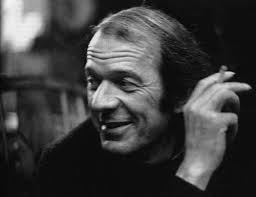Description
The Deleuze Seminars is a collection of audio recordings, transcriptions, and English translations of, and supplemental materials from, the lectures French philosopher Gilles Deleuze gave during his career at the University of Paris 8.
"Foucault" was a 25-lecture seminar given from October 1985 to May 1986. In these lectures, Deleuze offers his interpretation and analysis of French philosopher Michel Foucault's work. Examining the theoretical foundations and major themes of Foucault's philosophy, Deleuze dedicates several lectures to each of what he calls the "three axes" of Foucault's thought. This seminar coincides with the publication of Deleuze's book Foucault (1986).
The 07 January 1986 lecture marks the second part of the seminar in which Deleuze examines the second axis of Foucault’s thought, power. Other topics of discussion include: historical or stratified formations, statements and visibilities; the visible; Raymond Roussel; the knowledge-power relationship; the Kantian universal subject; the hic et nunc (here and now); the here-now (ici-maintenant) of Foucault’s interviews in correlation with his books; centralized and transversal struggles; May 1968; Guattari; the criticism of representation; the prisons movement; the focal points (les foyers) of resistance to power and new types of struggle; the role of the intellectual in struggle; what it is to be a subject (at the time of the seminar); the year 1950 as the starting point of many of these questions; the Yugoslav communist politician, theorist and author Milovan Djilas; the Yugoslav rupture; Italian philosopher and politician Mario Tronti and Marxism; undocumented work (le travail noir); the new subjectivity; transversal relationships among small groups; the microphysics of power; French author André Gide and justice; French writer and political activist Jean Genet and the Black Panthers; scientists and the atomic bomb; the subject as an incarnation of singularities; historical continuity and subjectivity; the French centralism of Surrealism; the French sociologist Émile Durkheim; Gabriel Tarde; imitations and social inventions and the corpuscles of belief and desire; large bodies (ensembles) and microphysics; the French anthropologist and ethnologist Claude Lévi-Strauss; the six postulates of Foucault; primitive societies and exchange, gift and counter-gift; lineages (vertical structures) and the network of alliances (or practices); Nietzsche; series and the relationship of forces; power as diffused and not localized, yet local and never global; power as neither essence nor attribute, and lacking interiority; the example of the sealed letter; the microphysics of the offense; and force as a ratio between forces.
This dataset includes: four mp3 recordings of the lecture (total time, 2:59:20), an aggregate version of the audio recordings into a single mp3, and the complete French transcription of the recorded lecture in both pdf (36 pp) and plain text.
-
Les Séminaires de Deleuze sont une collection d'enregistrements audio, de transcriptions et de traductions en anglais et de documents complémentaires des conférences que le philosophe français Gilles Deleuze a donné lors de sa carrière à l'Université de Paris 8.
«Foucault» était un séminaire de 25 conférences donné d'octobre 1985 à mai 1986. Dans ces conférences, Deleuze offre son interprétation et son analyse de l’œuvre du philosophe français Michel Foucault. En examinant les fondements théoriques et les thèmes majeurs de la philosophie de Foucault, Deleuze consacre plusieurs conférences à chacun de ce qu'il appelle les «trois axes» de la pensée de Foucault. Ce séminaire coïncide avec la publication du livre de Deleuze Foucault (1986).
La conférence du 7 janvier 1986 marque la deuxième partie du séminaire où Deleuze examine le deuxième axe de la pensée de Foucault, le pouvoir. Les autres sujets de discussion comprennent: les formations historiques ou stratifiées, d’énoncés et de visibilités; le visible; Raymond Roussel; le rapport savoir-pouvoir; le sujet universel kantien; le hic et nunc; le ici-maintenant des entretiens en corrélation avec les livres de Foucault; luttes centralisées et transversales; mai 1968; Guattari; la critique de la représentation; le mouvement des prisons; les foyers de résistance au pouvoir et les nouveaux types de lutte; le rôle de l'intellectuel dans la lutte; qu'est-ce qu'être sujet (au moment du séminaire); l'année 1950 comme point de départ de beaucoup de ces questions; le politicien communiste, théoricien et auteur yougoslave Milovan Djilas; la rupture yougoslave; Le philosophe et politicien italien Mario Tronti et le marxisme; le travail noir; la nouvelle subjectivité; les rapports transversaux entre groupes restreints; la microphysique du pouvoir; l'auteur français André Gide et la justice; l'écrivain et militant politique français Jean Genet et les Black Panthers; les scientifiques et la bombe atomique; le sujet comme une incarnation des singularités; continuité historique et subjectivité; le centralisme à la Français du surréalisme; le sociologue français Émile Durkheim; Gabriel Tarde; imitations et inventions sociales et les corpuscules de la croyance et du désir; grands ensembles) et microphysique; l'anthropologue et ethnologue français Claude Lévi-Strauss; les six postulats de Foucault; sociétés primitives et l’échange, don et contre-don; les lignages (structures verticales) et le réseau d'alliances (ou pratiques); Nietzsche; les séries et les rapports des forces; le pouvoir est diffus et ne se laisse pas localisé, il est local et jamais global; le pouvoir n'est pas essence ni attribut, et n’a pas d'intériorité; l'exemple de la lettre cachet; la microphysique de délit; et force comme un rapport entre les forces.
Cite this work
Researchers should cite this work as follows:
- Gilles Deleuze (2017). Foucault: Lecture 9, 07 January 1986. Purdue University Research Repository. doi:10.4231/R7TQ5ZQ7
Tags
Notes
This research has been generously supported through a grant from the College of Liberal Arts, Purdue University.
The translations of Deleuze’s “Foucault” seminars have been made possible by a Scholarly Editions and Translations grant from the National Endowment for the Humanities. This research has also been generously supported through a grant from the College of Liberal Arts, Purdue University.
The description of this dataset is based on the meticulous work of Frédéric Astier, whose Les cours enregistrés de Gilles Deleuze, 1979-1987 has catalogued Deleuze’s seminars for those years.
Special thanks to the family of Gilles Deleuze and the University of Paris 8 for permission to reproduce the material published here.
The Deleuze Seminars
This publication belongs to the The Deleuze Seminars group.

